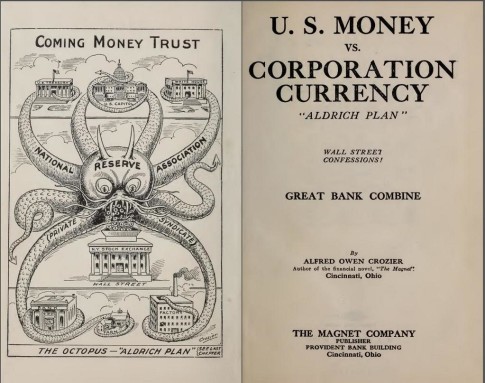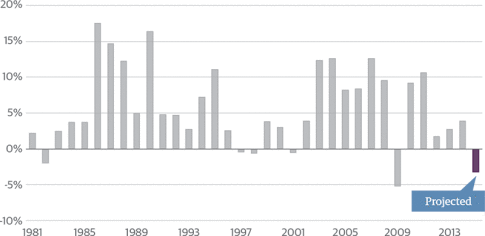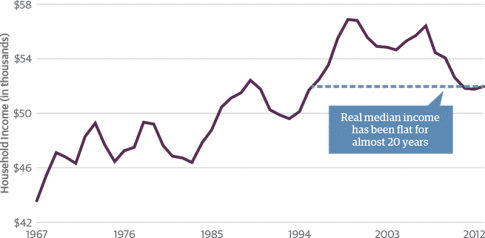– Finally The “Very Serious People” Get It: QE Will “Permanently Impair Living Standards For Generations To Come” (ZeroHedge, March 28, 2015):
When “very serious people” (even if it is those who once ran now defunct Bear Steanrs) announce it, with a 6 year delay, they make the Financial Times.
On the other hand, when Zero Hedge said precisely this 6 years ago, it was cast as a tin-foil clad group of conspriators who see the worst in every situation.
What is “it”? This:
The long-term consequences of global QE are likely to permanently impair living standards for generations to come while creating a false illusion of reviving prosperity.
In this case, it was said this week by Guggenheim’s Chairman of Investments and Global Chief Investment Officer, Scott Minerd. We are happy that increasingly more “serious people” come to the same conclusion which we posited first a 6 years ago.
* * *
Here is the full note:
The Monetary Illusion
As economic growth returns again to Europe and Japan, the prospect of a synchronous global expansion is taking hold. Or, then again, maybe not. In a recent research piece published by Bank of America Merrill Lynch, global economic growth, as measured in nominal U.S. dollars, is projected to decline in 2015 for the first time since 2009, the height of the financial crisis.
In fact, the prospect of improvement in economic growth is largely a monetary illusion. No one needs to explain how policymakers have made painfully little progress on the structural reforms necessary to increase global productive capacity and stimulate employment and demand. Lacking the political will necessary to address the issues, central bankers have been left to paper over the global malaise with reams of fiat currency.
With politicians lacking the willingness or ability to implement labor and tax reforms, monetary policy has perversely morphed into a new orthodoxy where even central bankers admittedly view it as their job to use their balance sheets as a tool to implement fiscal policy.
One argument is that if central banks were not created to execute fiscal policy, then why require them to maintain any capital at all? Capital is that which is held in reserve to absorb losses. If losses are to be anticipated, then a reasonable inference is that a certain expectation of risk must exist. Therefore, central banks must be expected to take on some risk for policy purposes, which implies a function beyond the creation of a monetary base to maintain price stability.
Global Nominal GDP Growth, as Measured in Dollars, Is Projected to Decline
With a surging U.S. dollar and growth remaining sluggish in much of the world, Bank of America Merrill Lynch forecasts that world output measured in dollars could fall in 2015 for the first time since the financial crisis. Over the past 34 years, this has happened just five times.
Source: IMF, BAML, Guggenheim Investments. Data as of 2/6/2015.
What kinds of risk are appropriate for a central bank? Well, the maintenance of a nation’s banking system would plainly be in scope, given the central bank’s role as lender of last resort. The defense of the currency as a store of value and medium of exchange is another appropriate risk. This was the apparent motivation of Mario Draghi, European Central Bank president, for his famous promise to defend the euro at all costs in the summer of 2012. The central bank balance sheet has proven a flexible tool limited in use only by the creativity of central bankers themselves.
In response to those who argue against the metamorphosis of monetary policy into fiscal policy, one need only point toward the impact of quantitative easing (QE) on interest rates. The depressed returns available on fixed-income securities, largely as a result of QE, are acting as a tax on investors, including individual savers, pension funds, and insurance companies.
Essentially, monetary authorities around the globe are levying a tax on investors and providing a subsidy to borrowers. Taxation and subsidies, as well as other wealth transfer payment schemes, have historically fallen within the realm of fiscal policy under the control of the electorate. Under the new monetary orthodoxy, the responsibility for critical aspects of fiscal policy has been surrendered into the hands of appointed officials who have been left to salvage their economies, often under the guise of pursuing monetary order.
The consequences of the new monetary orthodoxy are yet to be fully understood. For the time being, the latest rounds of QE should support continued U.S. dollar strength and limit increases in interest rates. Additionally, risk assets such as high-yield debt and global equities should continue to perform strongly.
Real Median Household Income Has Been Flat for 20 Years
Despite ultra-loose monetary policies over the past several years, incomes adjusted for inflation have fallen for the median U.S. family. With the benefits of monetary expansion going to a small share of the population and wage growth stagnating, incomes have been essentially flat over the past 20 years.
Source: Haver Analytics, Guggenheim Investments. Data as of 12/31/2013.
In the long run, however, classical economics would tell us that the pricing distortions created by the current global regimes of QE will lead to a suboptimal allocation of capital and investment, which will result in lower output and lower standards of living over time. In fact, although U.S. equity prices are setting record highs, real median household incomes are 9 percent lower than 1999 highs. The report from Bank of America Merrill Lynch plainly supports the conclusion that QE and the associated currency depreciation is not leading to higher global output.
The cost of QE is greater than the income lost to savers and investors. The long-term consequence of the new monetary orthodoxy is likely to permanently impair living standards for generations to come while creating a false illusion of reviving prosperity.
* * *
Wait, you mean printing money won’t fix the world’s problems? Unpossible.
Yet what is truly amazing is how many “experts” revealed themselves as useful, if utterly clueless idiots believing that one could create prosperity by printing money.


